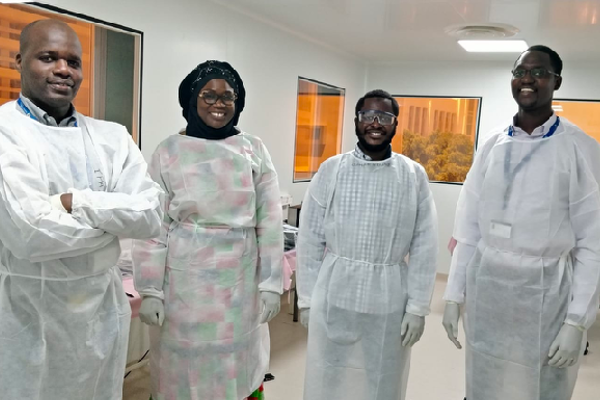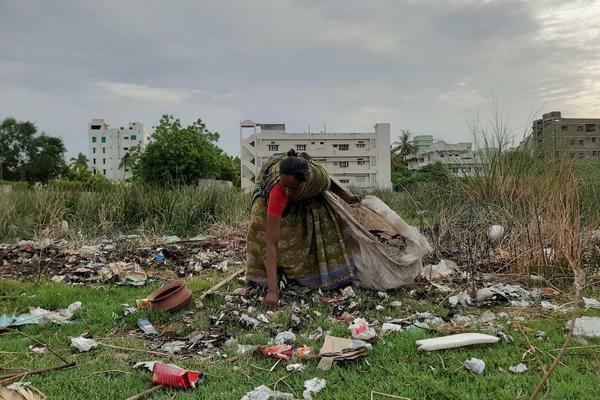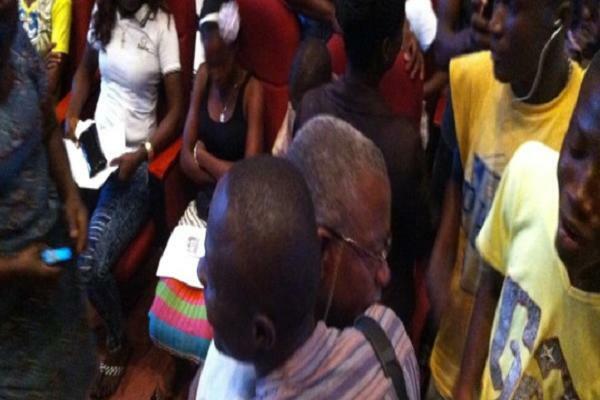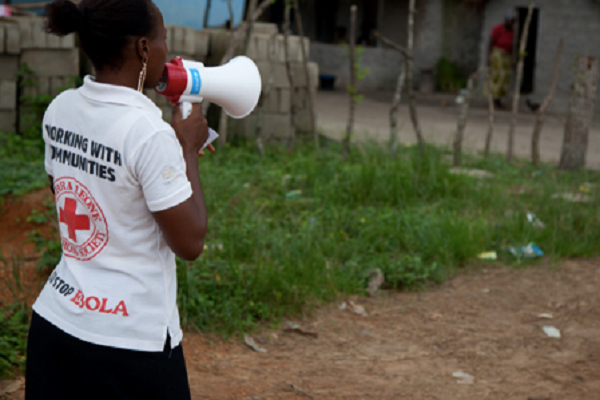
In crisis and in calm:
Creating global health and vaccine research that is fit for the future
Report of a series of online symposia
By Kate Hawkins
In the throes of planning this Liverpool symposium - on the role of scientific research in the creation and adoption of vaccines - we could never have anticipated how our worlds would shift on their axes due to COVID-19.
This led us to pivot to incorporate a focus on the pandemic and to switch to a series of three online events during April, May and June 2020. This demonstrates that - far from the plodding Ivory Tower stereotype that many ‘expert sceptics’ would have you believe – the world international health research is flexible, nimble and prepared to meet the real world-challenges faced by policy makers and implementers.
Through this report, the organisers of the symposia - LSTM, the UK Department for International Development (DFID) and Gavi – would like to explore the big and ultimately hopeful themes we heard and discuss what this may mean for the future.
We heard how researchers are working flexibly and responsively to meet ongoing health challenges in low and middle-income countries (LMICs). We collectively reaffirmed our commitment to a focus on the poorest and most marginalised people in our work and to increasing access to services, medicines and technologies.
Researchers, policy makers, private sector actors and decision-makers celebrated how their strengths are magnified when they work across siloes. Presenters explained how collaboration, relationships and trust are the foundation of health, and vaccine delivery, services.
Ultimately, this report is a call for global solidarity in the face of COVID-19 and other crises, but a solidarity that centres the knowledge and innovation of countries and people most affected by fragility and those resiliently responding on the ground.
Hear the UK Secretary of State for International Development, Rt Hon Anne-Marie Trevelyan MP pledge support for Gavi.Our symposia were sandwiched the highly successful UK Government Global Vaccine Summit to ensure funding for Gavi.
Flexibility, dynamism and responsiveness
Although we think of Corona Viruses as new diseases, they are not. They have been around for the past 40 or 50 years to our knowledge in animals and humans and we need to learn lessons from these previous viruses and apply them quickly to the COVID-19 outbreak.
Professor Julian Hiscox of the University of Liverpool
Right: Institut Pasteur de Dakar have built a state-of-the-art manufacturing facility for epidemics in just six months

Throughout our Symposia we heard how the response to disease outbreaks and more chronic health systems stressors in low- and middle-income countries is characterised by its flexibility, dynamism and responsiveness.
Lessons from Liberia and Sierra Leone on the response to Ebola Virus Disease are that researchers can play a key role in shaping emergency policy and implementation, collecting data in real time, providing expert advice on issues related to the health systems building blocks such as human resource management and supporting the nations recovery from shocks, particularly the psycho-social effects of epidemics.
Given the ongoing COVID-19 pandemic many of our discussions centred on how best to harness this dynamism in the creation and distribution of diagnostics, therapeutics and vaccinations. The importance of academia to the COVID-19 crisis response was very much in evidence. We heard how vaccine and diagnostics researchers in Liverpool are playing a leading role in supporting the WHO-led effort to move through the science, to trial, to manufacturing, to distribution pipeline.
Of course, speed it not everything and academics in our Symposia provided interesting reflections on the ethical implications of different types of vaccine trials and the importance of considering what practical steps should occur should we have a scientific breakthrough to ensure access to new technologies.
While we do not yet have a vaccine for COVID-19 there are many preparatory steps that we should be taking now so that we can be quick to act if one becomes available.
More on this from Dr Soumya Swaminathan, WHO's Chief Scientist.
I want to highlight the importance of responsive and people-centred health systems.
Professor Sally Theobald, Liverpool School of Tropical Medicine
Access and equity
“We remain committed to taking a leading role internationally in the COVID-19 response, and protecting people everywhere, particularly the most vulnerable.”
Rt Hon Wendy Morton MP, Parliamentary Under Secretary of State and Minister for European Neighbourhood and the Americas
Right: Suvartha is a waste-picker who lives on the edge of an informal settlement in Vijayawada, India

Ensuring equity in our response to global health and COVID-19 was a theme that echoed throughout the Symposia. Many people pointed to the importance of WHO-led processes to ensure the equitable distribution of a COVID-19 therapeutic or vaccine, should one become available. The UK Government representatives made strong statements in favour of a focus on the poorest when it comes to the COVID-19 response.
Others were more sceptical of the likelihood of the private sector and pharmaceutical companies working in the best interests of the poorest and most marginalised in low- and middle-income countries rather than for profit. But mechanisms to shape the pharmaceutical market such as Advance Market Commitments were put forward as a mechanism for positively skewing the market towards science that would benefit the poor. Gavi’s success over the last 20 years in vastly expanding immunization programmes and supporting primary health care was highlighted.
Access to a potential COVID-19 vaccine will not be plain sailing
Dr Seth Berkley outlines five challenges that we may face.
When considering the reality of delivering health services and vaccines we heard about the challenges that are faced by the most marginalised people living within urban informal settlements in low- and middle-income countries. These spaces are underserved by vaccine programmes. COVID-19 has highlighted existing inequities in all settings. In many low- and middle-income countries restrictions on movement are having devastating consequences for the livelihoods and coping strategies of many people, particularly those working in the informal sector. These affects can be gendered with rising rates of intimate partner violence against women, greater caring responsibilities and associated effects on mental well-being.
The poorest are likely to be the hardest hit by COVID-19 and the UK Government is committed to investing their efforts where it matters most
Listen to the UK Secretary of State for International Development, Rt Hon Anne-Marie Trevelyan MP
What needs to be highlighted is that these challenges - those experienced by the urban poor, exacerbated by the pandemic - result from political, economic and social processes and structures of exclusion, including failures of governance. We need to keep these in mind when considering interventions for these communities including the COVID-19 response.
Dr Rachel Tolhurst, Liverpool School of Tropical Medicine
Interdisciplinary research and innovative partnerships
"It is critical that not only do we come together from different areas of the world but also different parts of research. It is actually this coming together of all of these various aspects that will enable us to have the most effective impact together on the COVID-19 pandemic."
Chris Lewis, Head of Health Profession, UK Department for International Development
Right: Research nurses, in collaboration with the respiratory unit at LSTM bring patient samples back from Aintree and the Royal Hospitals in Liverpool

The world of international research brings together a vast number of stakeholders who pool their collective knowledge and strength to meet the needs of the most marginalised around the world. We heard how interdisciplinary arrangements for knowledge generation and the use of a range of research methods – from participatory action research to molecular science – will be needed in the COVID-19 response. We were reminded that that Corona viruses are not new, and have been studied since the 1930s. Previous work on Severe Acute Respiratory Syndrome (SARS) and Middle-Eastern Respiratory Syndrome (MERS) could assist us in moving forward.
This mix of disciplines will be particularly important as we work on vaccines, diagnostics, therapeutics, social and behavioural dynamics and the political and economic elements of pandemic response and recovery.
If we are to tackle health in low- and middle-income countries then partnership is key
More from Dr Jeremiah Chakaya, Respiratory Society of Kenya
We heard how partnerships with the private sector are not always plain sailing – particularly when academic and private sector incentives, ways of working and values may be out of sync – but that they can work well. Partnerships between Liverpool-based researchers and the private sector have vastly speeded up the development COVID-19 testing technology. The ACT Accelerator for COVID-19 has been an unprecedented example of public-private sector collaboration designed to leverage innovation in vaccine development and hope to ensure future equity in supply of COVID-19 vaccines. The example of Gavi was held up as a public-private partnership which has excelled in delivering global public goods in the form of vaccines and strengthened health systems.
We were challenged to think more widely about what our partnerships with the private sector might look like, particularly in low- and middle-income countries. For example, how influencers could help us overcome vaccine anxiety, hesitancy and myths and how work with the informal sector could assist in accelerating progress towards Universal Health Coverage. What is clear is the time for isolation and going it alone is long past.
“It is critical for the pharmaceutical sector in low- and middle-income countries to use the science and evidence to develop generic vaccines for their populations. Evidence that has been generated from the business and economics of manufacturing generic medicines needs to be translated to the creation of vaccines as well. There’s evidence that they have created cheaper drugs to reach more people. But they should not just wait for vaccine patents to phase out. Building capacity of pharmaceuticals in the developing world to develop novel vaccines would also be very, very critical.”
Dr Eliya Zulu, Director, African Institute for Development Policy
Collaboration, relationships and trust
The social contract between citizens and governments and trust in health systems are key to the delivery of health services and vaccines. Building close, productive and trusting relationships between different stakeholders and across sectors is key to global health successes.
Right: Rt Hon Walter Gwenigale, The Minister of Health in Liberia publicly hugs and consoles Ebola Virus Disease survivors

“Trust between the governed and the governing doesn’t come back quickly and is strained for many years to come…Historically epidemics have always led to people being more frightened of people that don’t look like us. They’ve been more frightened of people from foreign places. They’ve blamed each other and its led to tensions that have gone on far longer than once the epidemic itself has passed.”
Sir Jeremy Farrar, Director, Wellcome Trust
We heard that in Sierra Leone Ebola Virus Disease demonstrated and exacerbated low levels of trust between the people and the health system which negatively affected the efficacy of the response. The use of community health workers and Traditional Leaders as mediators between communities and services was key to rebuilding collaboration.
During the Ebola Virus Disease outbreak in Sierra Leone, Community Health Workers were seen as trusted information bearers by the community. They could bridge the divide between communities and the formal health system
Hear more from Dr Haja Wurie, Dean, College of Medicine and Allied Health Sciences, Sierra Leone
In Liberia community dialogues helped to mend some of the rifts that had occurred due to Ebola-related stigma and lack of trust more generally. Structural and longer-term interventions to tackle governance and accountability weaknesses also helped to build trust between citizens and decision-makers. Approaches to Ebola Virus Disease in West Africa contain many lessons that can inform our approach to the COVID-19 response.
We heard how community engagement is key to designing policies and programmes that are fit for purpose and not ‘one-size fits all’. For example, the design of social protection schemes should include representatives of affected communities and civil society organisations. This approach increases utility – it is more likely to lead to an effective response – but can also help strengthen accountability mechanisms and the realisation of human rights.
Cross-sectoral government engagement is also necessary for vaccine development, action on the social determinants of health and the delivery of complex health interventions. We heard from Malawi how the typhoid vaccine trials were delivered mainly through schools, pointing to the importance of partnership with Ministries of Education. Learning from interventions for Neglected Tropical Diseases pointed to the importance of working with Ministries with a responsibility for gender and the family. Researchers should look for partners and champions across governments alongside Ministries of Health.
Through collaborations and new relationships, built on mutual respect and trust we can ensure inclusivity in who participates in health-related decision-making and that it is led by those with the greatest knowledge of context.
“In terms of vaccine development, we want to make sure that the needs and the views of low- and middle-income countries are considered right from the beginning and through all the stages of vaccine development.”
Aurélia Nguyen, Managing Director, Vaccines and Sustainability Department, Gavi
Global solidarity and context specific granularity
Almost all speakers in the Symposia stressed the need for global cooperation, collaboration and skills sharing in relation to responding to the COVID-19 pandemic and tackling ill health more generally. That rhetoric became action when the UK Government made a pledge of £330 million a year for the next five years to Gavi, and supported a subsequent vaccine pledging summit which exceeded its targets to raise US$8.8 billion. The COVID-19 Response Fund coordinated by the World Health Organization remains under-resourced.
Right: A Community Health Worker raising awareness about Ebola Virus Disease with communities in Sierra Leone

The UK Government is committed to working internationally to ensure that the gains of COVID-19 research reach the poorest and most marginalised
Hear from Rt Hon Wendy Morton, MP
More specifically the symposia contained some critique of models of ‘white saviourism’ and many calls for global solidarity. The COVID-19 pandemic has very clearly shown that fragile health systems are not only found in low- and middle-income counties and that a high GDP is not as protective as was once imagined when it comes to disease outbreaks.
Our actions now, and the alliances we create will set the trajectory of our relationships in the future
Hear more about this from Sir Jeremy Farrar, Director of the Wellcome Trust
In responding to COVID-19 in low- and middle-income countries global solidarity will have to be informed by context specific granularity of knowledge. We heard a call for more context-specific research led by local experts which takes issues of equity, gender sensitivity and inclusivity as a starting point. It was suggested that this should be coupled with the creation of knowledge sharing platforms to share evidence from the South to the North and build capacity.
“I think in general the South-North learning still appears novel to most. So, when there are conferences and other opportunities for sharing these represent times to think more broadly and in more diverse ways about how to cross fertilize our ideas. I also think that small countries like Liberia and Sierra Leone are rarely privileged in global meetings to share lessons learned not only on ‘novel’ disease outbreaks but on general issues that they confront in primary care delivery in resource-poor/constrained settings.”
Dr Janice Cooper, Carter Centre, Liberia
Read more
- LSTM begins series of virtual vaccine research symposia with global guests and new funding pledge
- Collated questions from the 1st virtual symposium
- 'Access, equity and delivery': LSTM’s second virtual symposium on Global Health Research and Vaccination
- Collated Questions from 2nd virtual symposium
- LSTM's third virtual symposium on Global Health Research & Vaccination: Private sector partnership, research and accelerating the development of new tools
- Collated Questions from 3rd virtual symposium